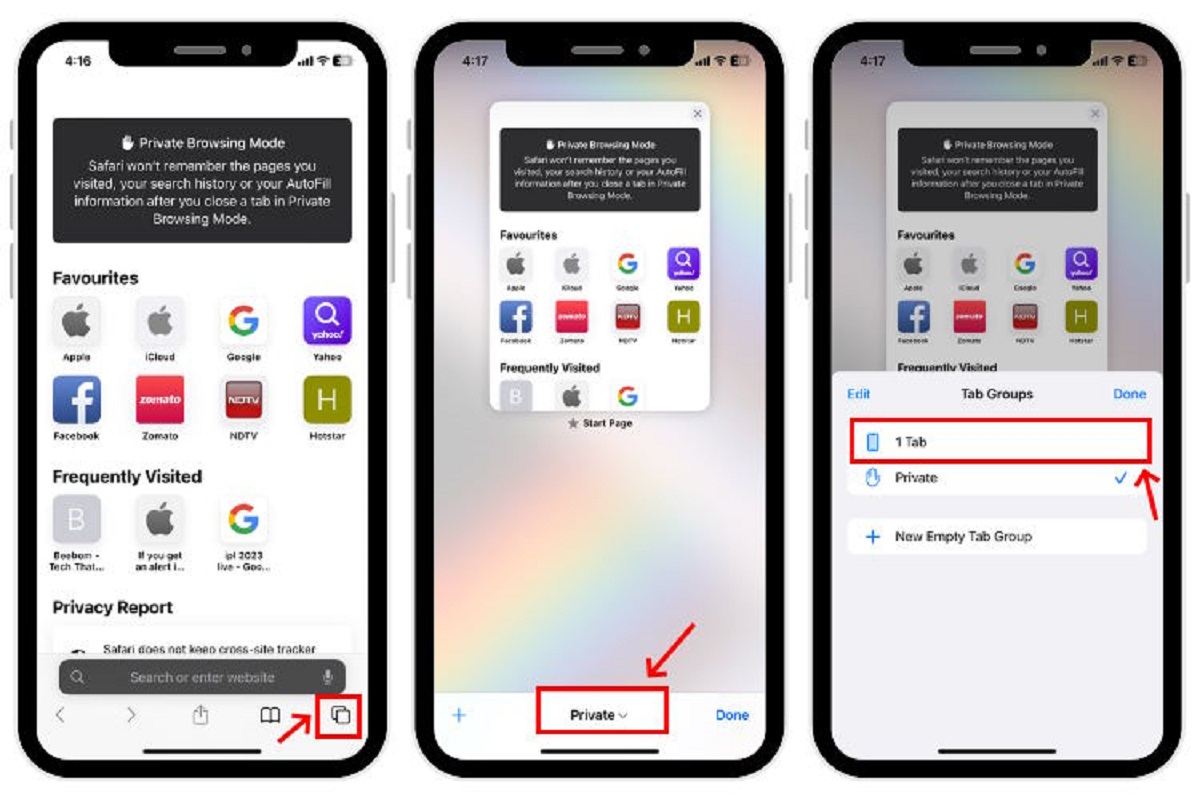Introduction
When it comes to browsing the internet, privacy is a top concern for many users. With the increasing prevalence of data breaches, online tracking, and targeted advertising, it's no wonder that people are seeking out the best browsers for privacy. In this article, we will delve into the world of web browsers and explore which ones offer the highest level of privacy protection.
Privacy-conscious internet users are often on the lookout for browsers that prioritize their personal data security and minimize the risk of unauthorized tracking. As the digital landscape continues to evolve, the need for robust privacy features in web browsers has become more critical than ever. With the vast array of browsers available, each boasting different features and levels of privacy protection, it can be challenging to determine which one is the best choice for safeguarding sensitive information.
In the following sections, we will examine the privacy concerns associated with popular browsers, explore the essential factors to consider when evaluating privacy features, and ultimately identify the best browsers that prioritize user privacy. By the end of this article, readers will have a comprehensive understanding of the options available to them and be empowered to make informed decisions about their online privacy and security.
Privacy Concerns with Popular Browsers
When it comes to online privacy, the browser you choose can have a significant impact on the security of your personal data. While popular browsers such as Google Chrome, Mozilla Firefox, Apple Safari, and Microsoft Edge offer a seamless browsing experience, they also raise notable privacy concerns.
Google Chrome: As the most widely used web browser, Google Chrome has faced scrutiny over its data collection practices. Google's business model heavily relies on targeted advertising, which necessitates the collection of user data. While Chrome offers some privacy features, such as Safe Browsing and site isolation, concerns persist regarding the amount of user data that Google collects and the potential for tracking across its services.
Mozilla Firefox: Firefox has long been championed for its commitment to user privacy. However, concerns have arisen regarding the default settings of the browser, which may allow certain telemetry and data collection. Additionally, while Firefox offers enhanced tracking protection and privacy-focused features, users must be vigilant in configuring the browser to maximize their privacy.
Apple Safari: Safari is known for its strong privacy stance, with features such as Intelligent Tracking Prevention aimed at limiting cross-site tracking. However, concerns have been raised about Apple's approach to enforcing privacy standards on third-party extensions and the potential for data collection through Apple's own services.
Microsoft Edge: With its transition to the Chromium engine, Microsoft Edge has gained popularity for its performance and compatibility. However, similar to Google Chrome, concerns exist regarding Microsoft's data collection practices and the potential for user tracking across its ecosystem.
In addition to these popular browsers, privacy concerns also extend to other lesser-known browsers and mobile versions. The prevalence of data tracking, targeted advertising, and potential vulnerabilities in browser extensions further compounds the privacy challenges faced by users across the digital landscape.
As users become increasingly aware of the implications of their online activities, the need for browsers that prioritize privacy and data security has become more pronounced. In the next section, we will explore the essential factors to consider when evaluating the privacy features of web browsers, empowering users to make informed decisions about their online privacy.
Factors to Consider for Privacy
When evaluating web browsers for their privacy features, several crucial factors come into play. These factors are instrumental in determining the level of protection a browser offers to safeguard users' personal data and online activities. Understanding these considerations empowers users to make informed decisions about which browser aligns best with their privacy preferences.
-
Privacy Settings and Customization: A browser's ability to allow users to customize privacy settings is paramount. Features such as cookie management, tracking protection, and the ability to block third-party scripts and content are essential for enhancing privacy. Additionally, the presence of a privacy dashboard or centralized settings for managing privacy preferences can significantly enhance the user's control over their data.
-
Data Collection and Telemetry: Transparency regarding data collection practices is crucial. Users should have clear visibility into the types of data collected by the browser, including browsing history, search queries, and interactions with websites. Furthermore, the option to opt out of telemetry and data collection should be readily available to users who prioritize privacy.
-
Security Updates and Patching: A browser's commitment to timely security updates and patching vulnerabilities is vital for maintaining a secure browsing environment. Regular updates ensure that known security flaws are addressed promptly, reducing the risk of exploitation by malicious actors seeking to compromise user privacy.
-
Extension Security and Permissions: Browser extensions can significantly impact privacy and security. Users should assess a browser's approach to extension security, including permissions requested by extensions and the level of scrutiny applied to third-party extensions available in the browser's marketplace. Additionally, the ability to restrict extensions from accessing sensitive data can bolster privacy protection.
-
Cross-Device Synchronization and Data Encryption: For users who rely on cross-device synchronization, the encryption of synchronized data is critical. End-to-end encryption and robust security measures for data synchronization ensure that sensitive information remains protected, even when accessed across multiple devices.
-
Incognito Mode and Private Browsing: The effectiveness of a browser's private browsing mode is a key consideration for privacy-conscious users. The ability to browse without saving history, cookies, or site data, coupled with protection against tracking during private sessions, enhances the privacy options available to users.
-
Community and Developer Commitment to Privacy: Assessing the browser's track record and the developer's commitment to privacy is essential. Community-driven browsers and those with a strong emphasis on open-source development often prioritize privacy and security, aligning with the values of users seeking robust privacy features.
By carefully evaluating these factors, users can gain a comprehensive understanding of a browser's approach to privacy and make informed decisions about which browser best aligns with their privacy requirements. In the subsequent section, we will delve into the best browsers for privacy, providing insights into the top choices for users seeking enhanced privacy protection.
Best Browsers for Privacy
When it comes to choosing a web browser that prioritizes privacy, several options stand out for their robust privacy features and commitment to safeguarding user data. These browsers offer a range of privacy-focused functionalities, from enhanced tracking protection to transparent data collection practices, empowering users to browse the web with confidence in their privacy and security.
1. Brave Browser
Brave has gained recognition for its strong privacy stance, incorporating features such as built-in ad and tracker blocking, HTTPS Everywhere, and aggressive cookie control. The browser's emphasis on blocking invasive advertisements and preventing tracking by default aligns with the privacy preferences of many users.
2. Mozilla Firefox
Mozilla Firefox has long been a champion of user privacy, offering enhanced tracking protection, strict anti-tracking settings, and the option to customize privacy preferences through its settings. With a strong commitment to open-source development and community-driven initiatives, Firefox continues to be a popular choice for privacy-conscious users.
3. Tor Browser
Built on the foundation of privacy and anonymity, the Tor Browser routes internet traffic through a global network of servers and encrypts it multiple times to enhance user privacy. By obscuring the user's IP address and preventing third-party trackers, Tor Browser provides a high level of privacy for users seeking anonymity during their online activities.
4. DuckDuckGo Privacy Browser
DuckDuckGo's Privacy Browser is designed with a focus on user privacy, incorporating built-in tracker blocking, a privacy grade rating for visited websites, and seamless encryption of connections. The browser's commitment to minimizing data collection and providing transparent privacy practices resonates with users seeking a privacy-first browsing experience.
5. Bromite
Bromite, a Chromium-based browser, prioritizes privacy by integrating ad and tracker blocking, enhanced fingerprinting protection, and aggressive cookie control. With a strong emphasis on user privacy and security, Bromite offers a compelling option for users seeking a privacy-focused browsing experience on Android devices.
6. Ungoogled Chromium
Ungoogled Chromium is a modified version of the Chromium browser that removes Google's integration and tracking features, providing users with a privacy-centric browsing environment. By eliminating Google's data collection mechanisms and enhancing privacy settings, Ungoogled Chromium offers a privacy-focused alternative for users who prefer the Chromium engine.
7. Waterfox
Waterfox, a fork of Firefox, emphasizes user privacy by removing telemetry and data collection features present in the original Firefox browser. With a commitment to providing a privacy-respecting browsing experience, Waterfox offers users an alternative that prioritizes data security and transparency.
These browsers represent a selection of the best options for users seeking enhanced privacy protection during their online activities. By leveraging a combination of advanced privacy features, transparent data practices, and a commitment to user security, these browsers empower users to take control of their online privacy and make informed choices about their browsing experience.
Conclusion
In today's digital age, where online privacy is increasingly under threat, the choice of a web browser plays a pivotal role in safeguarding personal data and ensuring a secure browsing experience. As we've explored the landscape of web browsers and their privacy features, it's evident that users have a diverse array of options when it comes to prioritizing their privacy.
The privacy concerns associated with popular browsers, such as Google Chrome, Mozilla Firefox, Apple Safari, and Microsoft Edge, have prompted users to seek alternatives that offer enhanced privacy protection. While these browsers have made strides in implementing privacy features, concerns persist regarding data collection, tracking, and the overall transparency of their privacy practices.
When evaluating web browsers for privacy, several critical factors come into play, including privacy settings and customization, data collection and telemetry, security updates and patching, extension security and permissions, cross-device synchronization, incognito mode, and the community and developer commitment to privacy. By considering these factors, users can make informed decisions about which browser aligns best with their privacy preferences.
The best browsers for privacy, including Brave Browser, Mozilla Firefox, Tor Browser, DuckDuckGo Privacy Browser, Bromite, Ungoogled Chromium, and Waterfox, offer a range of privacy-focused functionalities, from ad and tracker blocking to encryption and enhanced tracking protection. These browsers empower users to browse the web with confidence, knowing that their personal data is being prioritized and protected.
Ultimately, the quest for privacy-centric web browsers reflects a growing awareness and demand for enhanced privacy features in the digital realm. As users become more discerning about their online privacy, the browsers that prioritize user data security, transparency, and control will continue to gain traction and shape the future of secure and privacy-respecting browsing experiences.
By staying informed about the privacy landscape and making conscious choices about the browsers they use, users can assert greater control over their online privacy and contribute to a digital environment that values and prioritizes the protection of personal data. As technology evolves, the quest for privacy-enhancing browsers will remain a cornerstone of the digital experience, empowering users to navigate the web with confidence and peace of mind.

























